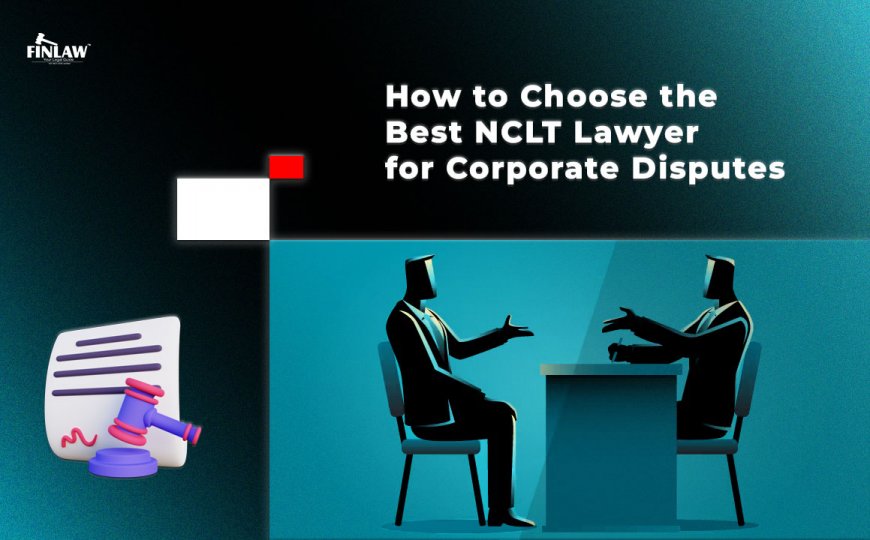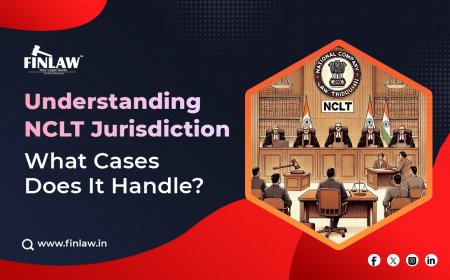How to Choose the Best NCLT Lawyer for Corporate Disputes
Looking for the best NCLT lawyers in India? Discover key factors to consider when hiring a lawyer for corporate disputes and NCLT litigation.

Introduction
When corporate disputes escalate, they often land before the National Company Law Tribunal (NCLT), India's quasi-judicial authority handling matters under the Companies Act, 2013 and the Insolvency and Bankruptcy Code (IBC), 2016. From shareholder disagreements and mergers to insolvency petitions and oppression claims, these cases require legal precision, strategic thinking, and industry experience.
If you’re navigating such challenges, choosing the right NCLT lawyer isn’t just advisable—it’s essential. But with countless law firms and practitioners claiming expertise in NCLT matters, how do you identify the one best suited to your business needs?
In this article, we break down how to evaluate and hire the best NCLT lawyers in India for corporate disputes.
What Is the Role of an NCLT Lawyer?
Before diving into the selection process, it's crucial to understand what NCLT lawyers do. These legal professionals represent clients in matters such as:
-
Company law disputes (e.g., mismanagement, oppression)
-
Insolvency and Bankruptcy Code (IBC) proceedings
-
Mergers and amalgamations
-
Shareholder and director disputes
-
Revival and rehabilitation of sick companies
-
Appeals before NCLAT (National Company Law Appellate Tribunal)
Their responsibilities often include drafting petitions, filing applications, handling creditor claims, presenting oral arguments, negotiating settlements, and ensuring compliance with corporate regulations.
Why Choosing the Right NCLT Lawyer Matters
Not all litigation is equal. NCLT cases often involve:
-
High financial stakes
-
Complex legal interpretations
-
Strict procedural timelines under IBC
-
The possibility of liquidation or corporate restructuring
An inexperienced or ill-suited lawyer could not only slow down the process but also result in adverse orders that impact your business operations and reputation.
Key Factors to Consider When Hiring NCLT Lawyers
Here are critical parameters to evaluate:
1. Specialization in Corporate and Insolvency Law
Check if the lawyer has specific experience with NCLT cases—especially those involving IBC, shareholder rights, or company restructuring. Lawyers with a strong focus on corporate litigation will better understand tribunal expectations and sector-specific nuances.
Tip: Look for case studies or judgments they've been involved in—these can offer insights into their real-world expertise.
2. Track Record of Successful Outcomes
While no lawyer can guarantee a win, a consistent record of favorable judgments, settlements, or case dismissals in the NCLT reflects strategic acumen.
Ask for:
-
Recent matters they’ve handled
-
Nature of representation (creditor vs. debtor vs. operational stakeholder)
-
Industry types they've served
3. Experience with the Insolvency and Bankruptcy Code (IBC)
Since many corporate disputes are filed under IBC—either under Section 7 (financial creditors), Section 9 (operational creditors), or Section 10 (corporate debtor)—your lawyer should be fluent with the Code’s application, timelines, and procedural requirements.
Example: Missing a CIRP deadline or filing an incomplete Form 5 can derail an entire insolvency case.
4. Understanding of Financial and Business Operations
NCLT matters are not always black-and-white legal issues. They often involve balance sheets, valuation reports, audit trails, or forensic findings. A competent NCLT lawyer should be able to interpret financial documents or coordinate effectively with forensic auditors, CAs, and IRPs/RPs.
5. Strong Research and Drafting Skills
Many NCLT orders are based on well-drafted petitions and replies. The clarity, logic, and legal referencing in these documents can influence how your case is perceived.
Look for:
-
Sample petitions or written submissions
-
Their approach to legal research and citations
-
Familiarity with relevant case laws from NCLAT and Supreme Court
6. Accessibility and Responsiveness
Time is of the essence in NCLT matters—especially in IBC cases with strict timelines. Your lawyer must be available for hearings, filings, and client updates.
Red flag: Lawyers who are hard to reach or delegate everything to juniors may not be ideal for urgent corporate matters.
7. Transparency in Fee Structure
While quality legal counsel comes at a price, the billing structure must be clear. Ask for:
-
Hourly vs. retainer-based fee models
-
Court appearance charges
-
Drafting/documentation costs
-
Refund policies for uncontested closures
Always ensure the engagement letter outlines scope and deliverables.
Where to Find the Best NCLT Lawyers in India
Here are some practical ways to start your search:
Bar Association Directories
The National Company Law Tribunal Bar Associations (especially in Delhi, Mumbai, and Chennai) maintain directories of experienced NCLT practitioners.
Law Firm Websites
Boutique firms specializing in corporate litigation often feature detailed lawyer profiles, case studies, and client testimonials. Examples include firms that handle insolvency, M&A, or corporate fraud.
Legal Platforms
Platforms like Finlaw, LawRato, iPleaders, Vakilsearch, and Legal500 list top-rated lawyers based on location and practice area.
Referrals
Corporate clients, chartered accountants, and company secretaries often know reputed NCLT lawyers through previous engagements.
Questions to Ask Before Hiring an NCLT Lawyer
Before onboarding a lawyer, ask:
-
How many NCLT cases have you handled in the past year?
-
What was your role—creditor, debtor, or investor representative?
-
How familiar are you with CIRP and liquidation procedures?
-
Can you share your success stories or judgments?
-
How do you charge—retainer, hearing-wise, or fixed-fee?
-
What is your availability for urgent matters or hearings?
Mistakes to Avoid When Choosing an NCLT Lawyer
-
Hiring general practitioners who lack corporate law specialization.
-
Falling for big law firm names without verifying the specific lawyer who’ll handle your case.
-
Delaying lawyer engagement until just before filing deadlines.
-
Choosing only based on cost, ignoring experience and capability.
Top Law Firms and NCLT Lawyers in India (2025 Snapshot)
While individual preferences vary, some names and firms stand out for NCLT litigation:
|
Name |
Location |
Known For |
|
Mumbai |
International Legal & Corporate Consultant |
|
|
Cyril Amarchand Mangaldas |
Mumbai |
Large insolvency & restructuring matters |
|
Shardul Amarchand Mangaldas |
Delhi |
IBC representation for large corporates |
|
AZB & Partners |
Pan-India |
Cross-border insolvency, mergers |
|
Khaitan & Co. |
Mumbai, Kolkata |
High-stakes NCLT appeals |
|
Independent Practitioners |
Delhi, Bengaluru |
Insolvency applications, shareholder disputes |
For SMEs or startups, many boutique or mid-sized firms offer personalized, cost-effective NCLT representation.
Conclusion
Whether you're a creditor seeking debt recovery, a shareholder alleging mismanagement, or a corporate debtor facing insolvency, choosing the right NCLT lawyer is a critical step in securing a favorable outcome. Prioritize experience, transparency, and responsiveness over mere reputation. A good lawyer won’t just argue your case—they'll become a strategic partner in navigating complex corporate disputes.
Frequently Asked Questions (FAQs)
Q1. How much do NCLT lawyers charge in India?
Charges can vary widely—from ₹25,000 per appearance for individual practitioners to ₹2–5 lakhs for high-profile law firms per case. Always discuss the scope before hiring.
Q2. Can I approach NCLT without a lawyer?
Technically yes, but given the complexity of laws and processes, it is not advisable. Legal representation ensures procedural compliance and strengthens your case.
Q3. What is the average timeline for an NCLT matter?
IBC cases have strict timelines—180 days for CIRP (extendable to 330 days). However, shareholder and oppression cases can take 6 months to 2 years, depending on complexity.
Q4. Are there different NCLTs for different states?
Yes, NCLT benches are located across India—Mumbai, Delhi, Kolkata, Chennai, Bengaluru, etc. You must file based on the registered office of the company involved.
What's Your Reaction?



















